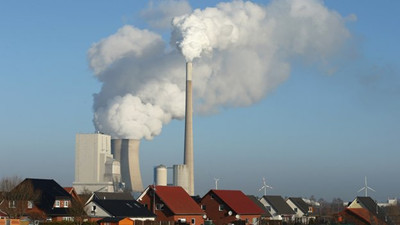歐洲能源
The gasman cutteth
煤氣工人面臨裁員
Europe could survive a cut-off of Russian gas, but only a short one
短期內歐洲有能力應對俄羅斯天然氣供應的中斷,但也僅限于短期內
NAPOLEON and Hitler both succumbed to the bitter Russian winter in their efforts at territorial expansion in Europe. Now, Vladimir Putin seems to be exporting a bit of Russian chill as part of his strategy to shift Europe's borders in his favour. In recent days there have been ill-explained reductions in the flow of gas that Gazprom, a Russian state firm, supplies to Poland, Austria and Slovakia—possibly to warn them off re-exporting any of it to Ukraine.
拿破侖和希特勒在拓寬歐洲疆土的戰爭中都敗給了俄羅斯冷瑟的冬天。現在,弗拉基米爾·普京似乎又在利用俄羅斯寒冷的天氣來控制歐洲疆土的。近日,俄羅斯過硬能源業巨頭俄羅斯天然氣公司莫名地削減了其對波蘭、奧地利和斯洛伐克的天然氣供應量,也許是在警告歐洲國家禁止向烏克蘭再出口天然氣。

Russia provides one-third of the gas that other European countries rely on to heat their homes, generate electricity and feed industry. So far the assumption among western European governments and industrial gas users is that even if relations with Russia worsen further, there is little danger of a complete and long-term cut in supplies, since Russia's government is so dependent on the revenues from gas exports.
歐洲國家依賴天然氣供暖、發電、為工廠提供能源,這些天然氣有1/3是由俄羅斯提供的。目前,西歐各國的政府和工業燃氣商推測認為,即使歐洲和俄羅斯的關系進一步惡化,長期的徹底停氣的可能性也是很小的,因為俄羅斯很需要燃氣出口帶來的收入。
However, a short-term interruption in the coming months, as winter descends, is not so unthinkable. Fortunately, most European countries would be able to struggle through. Their gas-storage facilities are about 90% full, since last winter was mild and they did a bit of further topping-up over the summer. Last year Europe imported 155 billion cubic metres (bcm) of Russian gas; stocks currently stand at 75bcm. So European energy distributors would have a few months' grace to find alternative supplies.
然而,在未來幾個月的冬天里出現一個短期的供氣中斷是完全有可能的。好在歐洲有能力平穩度過一個短暫的停氣期。由于去年冬天比較溫和,同時歐洲在今年夏天又進一步增加了儲氣量,現在儲氣設備的儲氣量大概已達到90%。去年,歐洲向俄羅斯進口了1550億立方米天然氣,到現在為止的剩余存量還有750億立方米。所以歐洲的能源經銷商在未來幾個月內有充足的時間去尋找替代供應源。
Norway, a big producer, could pump a bit more. China's slowing economy and Japan's reopening of some nuclear plants will mean more liquefied natural gas (LNG) is available on spot markets, though it is costly. Europe has the capacity to import more than 200bcm of LNG a year, of which just 20% is in use. Contingency plans being drawn up by the EU are also said to include cutting gas to industry to preserve supplies for heating homes and generating power.
挪威盛產天然氣,它可以適量增加對歐盟的供應量。中國的經濟增長放緩,日本核工廠開始重建,這些因素都會使得現貨市場上天然氣的供應量增加,雖然不是免費的。歐洲每年最多可以進口超過2000億立方米液化天然氣,但是其中只有20%投入使用。據說,歐盟制定的應急計劃還包這樣一項:為了保障家用暖氣和電力的正常供應,會削減工業燃氣的供應量。
Half of Europe's imports of gas come down pipes that traverse Ukraine, and Russia has cut their flow several times since 2006 over price disputes with the Ukrainians. If it did so again, it might pump more gas down pipelines that bypass Ukraine. Trouble is, these do not reach those countries most dependent on Russian gas, such as Hungary, Bulgaria, the Baltic states and Finland. The Finnish coalition government is at risk of falling because the Green party is threatening to quit over plans to buy a Russian nuclear reactor, which it says would increase, not reduce, dependence on Russia.
歐洲的進口的天然氣有一半是從橫穿烏克蘭的管道輸入的,自2006年烏俄就天然氣價格發生爭執以來,俄羅斯曾多次中斷過這條管道的天然氣流。如果這次俄羅斯手段照舊,那么它應該會增加其他繞行烏克蘭的管道的天然氣流量。但是問題是,這些擾心管道并不能到達那些最依賴俄羅斯供氣的國家,如匈牙利、保加利亞、波羅的海諸國和芬蘭。芬蘭聯合政府正面臨著垮臺的危險,因為綠黨威脅要撤銷購買俄羅斯核反應站的計劃,他們認為這個計劃會加重而不是減輕芬蘭對俄羅斯的依賴。
EU countries are making some preparations for short-term cut-offs but almost nothing has been done to reduce long-term reliance on Russia. There is much that could be done: governments could encourage the building of more cross-border pipelines to connect customers to sources of supply, including the underused LNG import terminals; more storage capacity could be provided; and those countries with shale reserves could get fracking. So far all that has been produced is hot air, and not the useful kind.
歐盟國家正在為短期供氣中斷做準備,但是目前并沒有采取任何措施來減輕歐盟對俄羅斯的長期依賴。其實有很多可以做的:政府可以鼓勵開通更多的跨境管道,開發利用率不高的液化天然氣進口港,從而連接資源的供應方和需求方;增大天然氣貯備能力;頁巖儲量豐富的國家可以加工油頁巖以開發能源。目前為止,歐洲所做的僅僅是夸夸其談,而并無實事。












